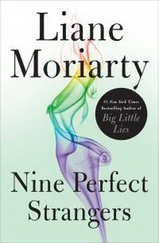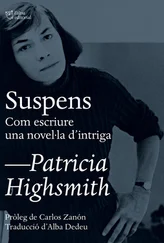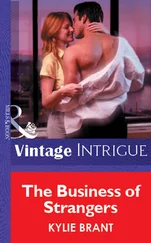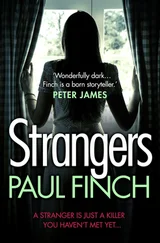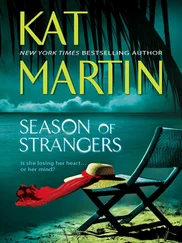In August, he went North to see Anne. She was working in the design department of a textile company in Manhattan. In the fall, she planned to go into partnership in a shop with another woman designer she had met. Neither of them mentioned Miriam until the fourth and last day of Guy’s visit. They were standing by the brook behind Anne’s house, in their last few minutes together before Anne drove him to the airport.
“Do you think it was Markman, Guy?” Anne asked him suddenly. And when Guy nodded: “It’s terrible—but I’m almost sure.”
Then one evening when he returned from Brillharts house to the furnished room where he lived, a letter from Bruno awaited him with one from Anne. The letter was from Los Angeles, forwarded by his mother from Metcalf. It congratulated him on his work in Palm Beach, wished him success, and begged for just a word from him. The P. S. said: Hope you are not annoyed at this letter. Have written many letters and not mailed them. Phoned your mother for your address, but she wouldn’t give it to me. Guy, honestly there is nothing to worry about or I wouldn’t have written. Don’t you know I’d be the first one to be careful? Write soon. I may go to Haiti soon. Again your friend and admirer. C. A. B.
A slow ache fell through him to his feet. He could not bear to be alone in his room. He went out to a bar, and almost before he knew what he was doing, had two ryes and then a third. In the mirror behind the bar, he saw himself glance at his sunburnt face, and it struck him that his eyes looked dishonest and furtive. Bruno had done it. It came thundering down with a weight that left no possibility of doubt any longer, like a cataclysm that only a madman’s unreason could have kept suspended all this while. He glanced about in the little bar as if he expected the walls to topple down on him. Bruno had done it. There was no mistaking Bruno’s personal pride in his, Guy’s, freedom now. Or the P. S. Or possibly even the trip to Haiti. But what did Bruno mean? Guy scowled at the face in the mirror and dropped his eyes, looked down at his hands, the front of his tweed jacket, his flannel trousers, and it flashed through his mind he had put these clothes on this morning as a certain person and that he would take them off tonight as another person, the person he would be from now on. He knew now. This was an instant—He could not say just what was happening, but he felt his entire life would be different, must be different, from now on.
If he knew Bruno had done it, why didn’t he turn him in? What did he feel about Bruno besides hatred and disgust? Was he afraid? Guy didn’t clearly know.
He resisted an impulse to telephone Anne until it was too late, and finally, at three in the morning, could resist no longer. Lying on his bed in the darkness, he talked to her very calmly, about commonplace matters, and once he even laughed. Even Anne did not notice anything wrong, he thought when he had hung up. He felt somehow slighted, and vaguely alarmed.
His mother wrote that the man who had called while he was in Mexico, and said his name was Phil, had called again to ask how he might reach him. She was worried that it might have something to do with Miriam, and wondered if she should tell the police.
Guy wrote back to her: “I found out who the annoying telephoner was. Phil Johnson, a fellow I knew in Chicago.”
Seventeen
“Charley, what’re all these clippings?”
“Friend of mine, Ma!” Bruno shouted through the bathroom door. He turned the water on harder, leaned on the basin, and concentrated on the bright nickel-plated drainstop. After a moment, he reached for the Scotch bottle he kept under towels in the clothes hamper. He felt less shaky with the glass of Scotch and water in his hand, and spent a few seconds inspecting the silver braid on the sleeve of his new smoking jacket. He liked the jacket so much, he wore it as a bathrobe also. In the mirror, the oval lapels framed the portrait of a young man of leisure, of reckless and mysterious adventure, a young man of humor and depth, power and gentleness (witness the glass held delicately between thumb and forefinger with the air of an imperial toast)—a young man with two lives. He drank to himself.
“Charley?”
“Minute, Mom!”
He cast a wild eye about the bathroom. There was no window. Lately it happened about twice a week. Half an hour or so after he got up, he felt as if someone were kneeling on his chest and stifling him. He closed his eyes and dragged air in and out of his lungs as fast as he could. Then the liquor took. It bedded his leaping nerves like a hand passing down his body. He straightened and opened the door.
“Shaving,” he said.
His mother was in tennis shorts and a halter, bending over his unmade bed where the clippings were strewn. “Who was she?”
“Wife of a fellow I met on the train coming down from New York. Guy Haines.” Bruno smiled. He liked to say Guy’s name. “Interesting, isn’t it? They haven’t caught the murderer yet.”
“Probably a maniac,” she sighed.
Bruno’s face sobered. “Oh, I doubt it. Circumstances are too complicated.”
Elsie stood up and slid her thumb inside her belt. The bulge just below her belt disappeared, and for a moment she looked as Bruno had seen her all her life until this last year, trim as a twenty-year-old down to her thin ankles. “Your friend Guy’s got a nice face.”
“Nicest fellow you ever saw. It’s a shame he’s dragged in on it. He told me on the train he hadn’t seen his wife in a couple of years. Guy’s no more a murderer than I am!” Bruno smiled at his inadvertent joke, and to cover it added, “His wife was a roundheels anyway—”
“Darling.” She took him by the braidedged lapels. “Won’t you watch your language a little for the duration? I know Grannie’s horrified sometimes.”
“Grannie wouldn’t know what a roundheels means,” Bruno said hoarsely.
Elsie threw her head back and shrieked.
“Ma, you’re getting too much sun. I don’t like your face that dark.”
“I don’t like yours that pale.”
Bruno frowned. The leathery look of his mother’s forehead offended him painfully. He kissed her suddenly on the cheek.
“Promise me you’ll sit in the sun a half hour today anyway. People come thousands of miles to get to California, and here you sit in the house!”
Bruno frowned down his nose. “Ma, you’re not interested in my friend!”
“I am interested in your friend. You haven’t told me much about him.”
Bruno smiled shyly. No, he had been very good. He had let the clippings lie out in his room only today for the first time, because he was sure now both he and Guy were safe. If he talked a quarter of an hour about Guy now, his mother would probably forget, too. If it were even necessary that she forget. “Did you read all that?” He nodded toward the bed.
“No, not all that. How many drinks this morning?”
“One.”
“I smell two.”
“All right, Mom, I had two.”
“Darling, won’t you watch the morning drinks? Morning drinks are the end. I’ve seen alcoholic after alcoholic—”
“Alcoholic is a nasty word.” Bruno resumed his slow circuit of the room. “I feel better since I drink a little more, Ma. You said yourself I’m more cheerful and my appetite’s better. Scotch is a very pure drink. Some people it agrees with.”
“You drank too much last night, and Grannie knows it. Don’t think she doesn’t notice, you know.”
“About last night don’t ask me.” Bruno grinned and waved his hand.
“Sammie’s coming over this morning. Why don’t you get dressed and come down and keep score for us?”
“Sammie gives me ulcers.”
She walked to the door as gaily as if she had not heard. “Promise me you’ll get some sun today anyway.”
Читать дальше




